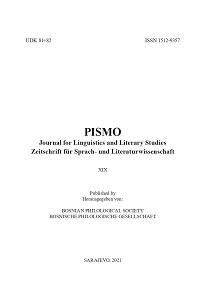Jednojezični ili dvojezični rječnik u nastavi engleskog jezika kao drugog/stranog jezika
Monolingual or Bilingual Dictionaries in an EFL/ESL Classroom
Author(s): Amina ArnautovićSubject(s): Language studies, Foreign languages learning, Lexis, Sociolinguistics, Philology
Published by: Bosansko filološko društvo
Keywords: choice of dictionary; bilingual dictionary; monolingual dictionary; learner’s dictionary; English language; English language teaching;
Summary/Abstract: The need to use dictionaries in education is clear and indisputable. The same does not apply to dictionary culture, which often occupies an unenviable position in both curricular and extracurricular language learning contexts. The mere existence of a need for a particular practice is not a sufficient motive for its adoption and practical implementation. Accordingly, the mere need to use dictionaries along with a lack of habit will not result in the development of dictionary culture in the true sense of the word. The process of establishing a dictionary culture should be initiated in the early school years, and it should be continuously developed and nurtured throughout education. The purpose of this paper is to shed light on both the need for and potential ways of developing the habit and skills of using dictionaries in foreign language teaching and learning with the aim of educating independent dictionary users. Through discussing the importance of cultivating the use of dictionaries, the paper aims to give a well-grounded answer to the question of the type of dictionary which should be given preference in language teaching contexts ‒ bilingual or monolingual. The answer offered is based on an insight into lexicographic literature, but also on personal experience of foreign/second language acquisition and the practice of teaching English as a second or foreign language (ESL/EFL) and English for specific purposes (ESP). Without any intention of excluding bilingual dictionaries as possible teaching aids, the use of monolingual dictionaries, especially learner’s dictionaries, should be encouraged from the earliest stages of second/foreign language acquisition. Considering semantic, communicative-pragmatic, and grammatical information available in monolingual learner’s dictionaries, there is no doubt that this dictionary type can and should replace bilingual dictionaries, which should remain a complementary source of quick verification of equivalent translation into the mother tongue whenever needed.
Journal: Pismo - Časopis za jezik i književnost
- Issue Year: 2021
- Issue No: 19
- Page Range: 63-78
- Page Count: 16
- Language: Bosnian

